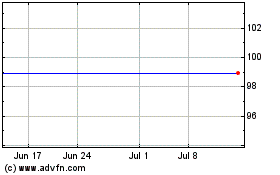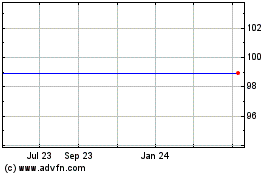In May, Cablevision Systems Corp. Chief Executive James Dolan
publicly implied that his family-controlled company could be a
prime acquisition candidate amid needed cable-industry
consolidation.
Nobody on Wall Street or in the media world knew how seriously
to take the comments, made at an industry convention. After all,
the Dolans had been at the altar in the past, but price was an
obstacle and it wasn't clear if the family would part with its core
asset.
As the summer progressed, Cablevision's prospects for finding a
dance partner dimmed, as the most obvious buyers—Time Warner Cable
Inc. and Charter Communications Inc.—had agreed to combine and
regulators had signaled there are limits on the domestic
consolidation they will allow. Moreover, Cablevision had become
expensive: its stock price had run up on deal-mania even as its
growth stagnated.
But Mr. Dolan and his father Charles, who started the company in
1973, found their exit route in the form of French billionaire
Patrick Drahi, who is on a mission to expand his telecom footprint
in the U.S. and was willing to pay up for a chunk of the prized New
York market.
Mr. Drahi's Altice NV on Thursday said it agreed to pay about
$10 billion to buy Cablevision, which generated $6.5 billion in
revenue last year. The Long Island, N.Y., company has 3.1 million
customers, making it the No. 5 U.S. cable operator by subscribers.
The $34.90-a-share offer represents a 22% premium to Cablevision's
closing price Wednesday, in a deal that values the company at $17.7
billion including assumption of debt. The companies expect the deal
to close in the first half of 2016.
The Wall Street Journal reported Wednesday evening that the
companies were in advanced talks.
The Dolans have controlled Cablevision through a 72.3% voting
stake, according to the latest proxy filing, and several family
members hold executive positions.
"I never thought I would see the family sell that business,"
said J.C. Sparkman, a cable-TV pioneer. It helps that Mr. Drahi is
paying "top dollar plus for anything he buys."
People familiar with the Dolans' thinking said the price was too
good to pass up, and they believe Mr. Drahi will be a good steward.
Another issue: Charles "Chuck" Dolan sees certain industry
developments, such as utility-style "net neutrality" regulations
and cable "cord-cutting," as negatives for the future, making it a
good time to cash out, people familiar with his thinking said.
Cablevision's other challenges include fierce competition with
Verizon Communications Inc.'s FiOS unit and its already
high-penetration of customers in its service area.
Despite his deep ties to the business, "Chuck is not a nostalgic
guy; it's about value creation for the shareholders," said Richard
Parsons, former chief executive of Time Warner Inc. and a board
member at Madison Square Garden Co., another company the Dolans
control.
The Dolans have toyed with selling the company numerous times,
people familiar with their thinking said. Time Warner Cable was a
long-time suitor. "If I had a nickel for every time we met with
Chuck starting in the late '80s till the time I left in 2007, I
could buy a lot of candy bars," said Mr. Parsons, who oversaw Time
Warner Inc. before it spun off Time Warner Cable.
Charles Dolan, 88 years old, was a cable pioneer, founding Home
Box Office (now owned by Time Warner Inc.) and building some of the
first urban cable systems in the U.S. in the 1960s and 1970s.
Attention will now turn to what the Dolans choose to do with
their other two major assets that were spun out of Cablevision in
recent years: AMC Networks Inc., whose eponymous TV network is
known for hits like "The Walking Dead" and "Breaking Bad," and
Madison Square Garden Co., owner of the New York Knicks, New York
Rangers and Radio City Music Hall.
Media executives have long said the younger Mr. Dolan, 60, who
plays in a rock band called JD & the Straight Shot and is known
for his involvement in managing the Knicks, appears more passionate
about the sports and entertainment parts of the family business
than the cable operation.
The Dolans own a 68.85% voting stake in MSG, which itself is
being split into two. The sports teams and venues will be a
separate venture from MSG's regional cable-TV sports networks. Some
merger advisers and media executives say the move could better
position one or both sides of the house for a sale.
After the Cablevision sale, James Dolan is likely to focus his
attentions on MSG's sports and entertainment businesses, including
MSG's joint venture with music mogul Irving Azoff, Mr. Parsons
said.
The Cablevision sale will net about $2 billion for the Dolans
after taxes, estimates BTIG analyst Brandon Ross. BTIG said a
long-term path for the family could be to stockpile cash through
asset sales to take the sports-and-entertainment side of MSG
private after the spin-off.
AMC, meanwhile, has been a star performer but faces a strategic
quandary as the cable-TV model comes under stress as subscribers
cut the cord and marketers move more of their ad dollars to the
digital world. The Dolans have a 65.8% voting stake in AMC.
Being part of a bigger media outfit would likely benefit AMC,
giving it more weight in carriage negotiations with cable and
satellite distributors, media executives and analysts say. The
company has held early deal talks with premium-cable channel owner
Starz LLC, according to people familiar with the matter. Bloomberg
earlier reported on those talks.
As the Dolans bow out of Cablevision, the cable industry will
lose a formidable contrarian voice. Because of its
family-controlled roots, Cablevision wasn't afraid to take
different paths from its larger cable peers. It was the first
operator to deploy tens of thousands of outdoor Wi-Fi hotspots,
allowing it to offer an alternative to cellular phone service that
transmits calls over Wi-Fi. It also fought a landmark legal battle
against major media companies that legalized the cloud-based
digital video recorder. It took on Viacom Inc. in court to press
for the right to "unbundle" TV channel packages, a case that is
pending.
Write to Shalini Ramachandran at
shalini.ramachandran@wsj.com
Subscribe to WSJ: http://online.wsj.com?mod=djnwires
(END) Dow Jones Newswires
September 18, 2015 08:05 ET (12:05 GMT)
Copyright (c) 2015 Dow Jones & Company, Inc.
Time Warner (NYSE:TWX)
Historical Stock Chart
From Mar 2024 to Apr 2024

Time Warner (NYSE:TWX)
Historical Stock Chart
From Apr 2023 to Apr 2024
